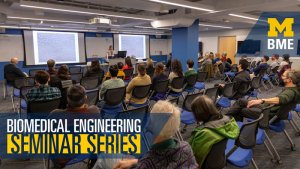Presented By: Biomedical Engineering
Biomedical Engineering Seminar Series
"Dual Modality Ultrasound and Optical Imaging Techniques for Diagnosis and Treatment Assessment of Breast, Ovarian, and Colorectal Cancer," with Quing (Ching) Zhu, Ph.D.

Abstract:
This talk will focus on our recent progress in utilizing dual-modality optical and ultrasound imaging techniques to advance the diagnosis and treatment assessment of breast, ovarian, and colorectal cancer. Ultrasound imaging has co-registered with optical imaging techniques to provide lesion morphology while optical imaging maps out lesion functional activity. The co-registered optical and ultrasound imaging techniques have been implemented on hand-held probes with different configurations suitable for imaging the breast, ovary, and rectum. Ultrasound lesion morphology information has been used for localizing lesions for optical imaging reconstruction and providing diagnostic output. Optical functional parameters and spatial distribution of total hemoglobin and oxygen saturation significantly improve the accuracy of ultrasound diagnosis and treatment response assessment. This talk will also discuss the promising roles of deep learning dual modality fusion models in cancer diagnosis and treatment prediction.
Bio:
Professor Quing Zhu is the Edwin H. Murty Professor of the Biomedical Engineering Department of Washington University in St. Louis. She also has a joint appointment in Radiology at Washington University School of Medicine in St Louis. Professor Quing Zhu has been named a Fellow of OSA, a Fellow of SPIE, and a Fellow of AIMBE. Her research interests are focused on imaging techniques and machine learning methods of photoacoustic tomography, diffused light imaging, ultrasound, and optical coherence tomography for cancer detection, diagnosis, and treatment assessment and prediction.
Zoom:
https://umich.zoom.us/j/94337625486
This talk will focus on our recent progress in utilizing dual-modality optical and ultrasound imaging techniques to advance the diagnosis and treatment assessment of breast, ovarian, and colorectal cancer. Ultrasound imaging has co-registered with optical imaging techniques to provide lesion morphology while optical imaging maps out lesion functional activity. The co-registered optical and ultrasound imaging techniques have been implemented on hand-held probes with different configurations suitable for imaging the breast, ovary, and rectum. Ultrasound lesion morphology information has been used for localizing lesions for optical imaging reconstruction and providing diagnostic output. Optical functional parameters and spatial distribution of total hemoglobin and oxygen saturation significantly improve the accuracy of ultrasound diagnosis and treatment response assessment. This talk will also discuss the promising roles of deep learning dual modality fusion models in cancer diagnosis and treatment prediction.
Bio:
Professor Quing Zhu is the Edwin H. Murty Professor of the Biomedical Engineering Department of Washington University in St. Louis. She also has a joint appointment in Radiology at Washington University School of Medicine in St Louis. Professor Quing Zhu has been named a Fellow of OSA, a Fellow of SPIE, and a Fellow of AIMBE. Her research interests are focused on imaging techniques and machine learning methods of photoacoustic tomography, diffused light imaging, ultrasound, and optical coherence tomography for cancer detection, diagnosis, and treatment assessment and prediction.
Zoom:
https://umich.zoom.us/j/94337625486